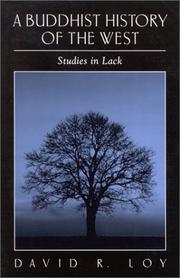| Listing 1 - 2 of 2 |
Sort by
|

ISBN: 0791452603 079145259X 9780791452608 Year: 2002 Publisher: Albany: State university of New York press,
Abstract | Keywords | Export | Availability | Bookmark
 Loading...
Loading...Choose an application
- Reference Manager
- EndNote
- RefWorks (Direct export to RefWorks)
Civilization, Western --- Philosophy, Buddhist. --- Buddhism --- Self (Philosophy) --- Identity (Psychology) --- Self-consciousness. --- Psychological aspects. --- Philosophy. --- Classical influences. --- Doctrines. --- Buddhist philosophy. --- Identity (Psychology). --- Self (Philosophy). --- Self-consciousness (Awareness). --- Civilization, Western - Psychological aspects. --- Civilization, Western - Philosophy. --- Civilization, Western - Classical influences. --- Buddhism - Doctrines.

ISBN: 0791489124 0585476217 9780585476216 079145259X 9780791452592 0791452603 9780791452608 9780791489123 Year: 2002 Publisher: Albany State University of New York Press
Abstract | Keywords | Export | Availability | Bookmark
 Loading...
Loading...Choose an application
- Reference Manager
- EndNote
- RefWorks (Direct export to RefWorks)
Buddhism teaches that to become happy, greed, ill-will, and delusion must be transformed into their positive counterparts: generosity, compassion, and wisdom. The history of the West, like all histories, has been plagued by the consequences of greed, ill-will, and delusion. A Buddhist History of the West investigates how individuals have tried to ground themselves to make themselves feel more real. To be self-conscious is to experience ungroundedness as a sense of lack, but what is lacking has been understood differently in different historical periods. Author David R. Loy examines how the understanding of lack changes at historical junctures and shows how those junctures were so crucial in the development of the West.
Self-consciousness (Awareness) --- Identity (Psychology) --- Self (Philosophy) --- Buddhism --- Buddhist philosophy. --- Civilization, Western --- Self-awareness --- Self-consciousness --- Consciousness --- Personal identity --- Personality --- Self --- Ego (Psychology) --- Individuality --- Philosophy --- Buddhist doctrines --- Buddhist theology --- Lamaist doctrines --- Philosophy, Buddhist --- Buddhism and philosophy --- Civilization, Classical --- Civilization, Occidental --- Occidental civilization --- Western civilization --- Doctrines. --- Classical influences. --- Philosophy. --- Psychological aspects.
| Listing 1 - 2 of 2 |
Sort by
|

 Search
Search Feedback
Feedback About UniCat
About UniCat  Help
Help News
News